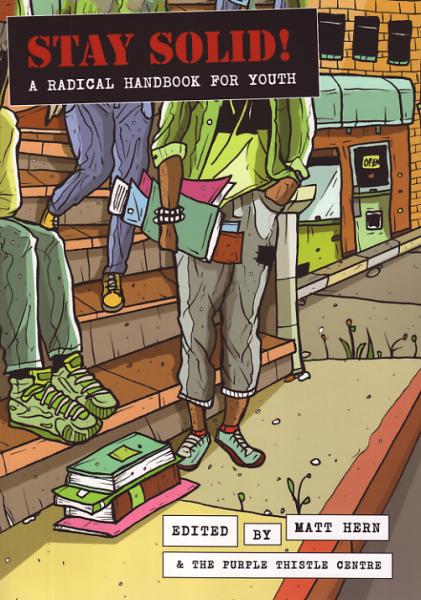Though there are many things I wish I could have said to my 14-year-old self, I now realize I could boil it all down to one phrase: “read this book.”
Stay Solid!: A Radical Guide for Youth is a beautifully chaotic scrapbook-style tome that gets across nearly everything a burgeoning activist would reasonably be looking to read more about.
Organized by topics like Sex, Media and Community, and interspersed with poetry, photography, comics, doodles and personal essays, it’s easy to devour in one sitting or flit around to the topics that strike a particular cord. Woven into these contributions are critiques of much larger institutions, topics such as the Legal System, Science and Gender.
The book is edited by Matt Hern and The Purple Thistle Centre, a youth-run resource centre in Vancouver.
Like the centre itself, the book stays true to the principles of horizontal organizing. Rather than creating a hierarchy where a few authors are the authority of topics, contributors are all given the same weight, regardless of their age or education.
The introduction assures the reader that there were “no bosses and all decisions are made by a collection of collectives.” Despite the youthful tone, sprinkled with teenage slang, the articles remain credible sources of current events and history that illuminate radical perspectives.
The hope generated by the centre shines through in the book. Contrary to mainstream media’s reports that youth are lazy, unemployed and all around up to no good, the introduction states an honest belief in youth’s potential to create lasting change.
This enthusiasm flows throughout every entry and will get readers of any age thinking more seriously about following their passion. It’s especially refreshing to see such an unabashed claim to radical politics reiterated in every aspect of the book.
The breadth of topics is ambitious and well executed. Standard teen issues, like Family, Relationships and Drugs are tackled with a radicalized twist.
For example, rather than listing off side effects that kill you, the drugs section talks about the ineffectiveness of prohibition like Dawn Paley’s scathing history of the war on drugs and real stories of drug use like Issack K. Oommen’s piece, offering real advice for teens using.
At times, there seems to be a tension in the entries. Balancing responsible drug use alongside severe addiction is difficult at the best of times and some of this struggle is left unresolved.
In his piece “An Apology from a Drug Educator,” Mark Haden straight up admits that he was a part of the problem without offering a hardline solution to drug education.
By not just handing out easy answers, Stay Solid! highlights complex grey areas within social justice issues that the reader must come to their own conclusions about. When new activists can become so polarized by their passion, this de-essentialising is exactly what’s needed.
There are distinct sections for Money Work & Success, Class & Class Struggles and Skills — a decision that speaks volumes. Without being preachy, the editors successfully go through an understanding of capitalism and surviving within the system without reinforcing an educational hierarchy.
Dana Putman’s essay “4 Things I Know About Class” lays down the everyday basics in points like “class is bigger than you … therefore it’s not your fault,” while pieces like Anna Hunter’s essay speak to owning an ethical business within an unethical economic structure.
Far beyond finding happiness in the rat race, the editors encourage youth to follow their desire to learn through deschooling, unschooling and skill sharing. Stories like Pete Jordan’s, an excerpt from his book Dishwasher, demonstrate that even the most menial paid labour can afford a rich learning experience.
Other sections contain more blunt advice.
In Dan Savage’s contribution for the hard-up teen, he lists marching orders on becoming the kind of person people want to have sex with: use basic hygiene, learn a lot of anatomy and become an interesting person with interesting hobbies. This direct method beats the “just be yourself” crap that teens see straight through.
Juxtaposed letters written by a teenager calling out adults and her father’s agreeing response, balance some perceived power dynamics. By legitimizing the lived experiences of youth, Stay Solid! empowers youth to take action.
This is not the kind of book that builds up to nothing — every section sheds light on action that youth can take immediately. Inspiration abounds and some pieces are definitely primers for high school drop outs, showing solidarity, learning an instrument or making a zine.
Besides offering an in-depth look at each topic by diverse contributors, each section begins with a round-up of further reading of academic and cultural media. Before each piece, there is also a short blurb about the contributor with links to more of their works.
In reality, this book is three or four times its size in resources.
Unfortunately, Stay Solid!’s accessibility to folks with disabilities is not as solid as it could be. Font and type size are changed frequently throughout the chapters, which is a possible barrier to people with low vision or learning disabilities.
This is a frustrating oversight, given the emphasis on disability activism highlighted by its own section. Many grassroots publications face similar problems of being accessible on a limited budget but this issue could be fixed with a screen reader friendly pdf in the future.
Despite this detail though, whether the youth in your life is your relative, your friend or even just your inner child, I can’t imagine a better book to press firmly into their hands.
Steffanie Pinch is the activist toolkit coordinator for rabble.ca



